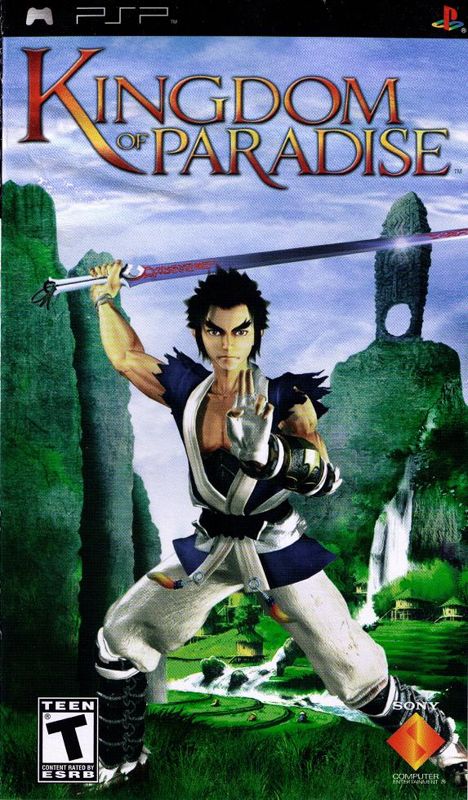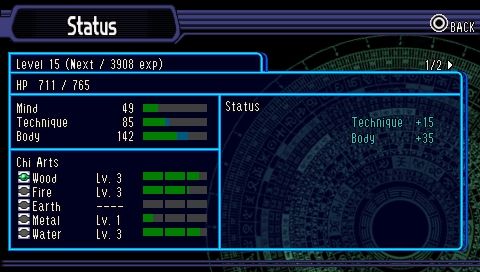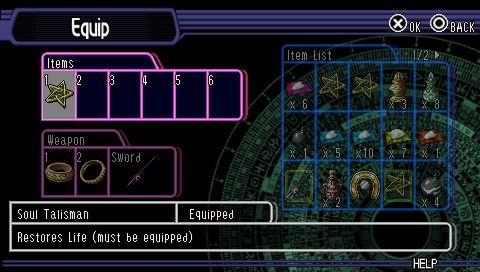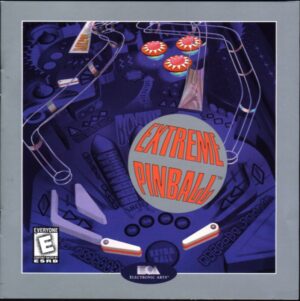Retro Replay Review
Gameplay
Kingdom of Paradise blends the fast-paced intensity of fighting games with the depth and progression of a traditional RPG. Players step into the shoes of Shinbu, a skilled swordsman, and engage in fluid, combo-driven combat that rewards precision timing and strategic use of abilities. The core fighting system allows you to string together basic attacks, advanced sword techniques, and devastating chi abilities for a truly satisfying experience on the battlefield.
(HEY YOU!! We hope you enjoy! We try not to run ads. So basically, this is a very expensive hobby running this site. Please consider joining us for updates, forums, and more. Network w/ us to make some cash or friends while retro gaming, and you can win some free retro games for posting. Okay, carry on 👍)
A standout feature is the scroll-and-tile mechanic. As you explore the land of Ouka, you collect scrolls and decorative tiles that can be arranged in specific sequences to unlock powerful, cinematic attacks. This customization element adds an extra layer of strategy: mixing and matching tiles can produce elemental effects—fire, water, wind, or earth—that turn the tide against tougher foes or large groups of enemies.
RPG elements also weave seamlessly into the action. Shinbu gains experience to improve his base stats, and he uncovers new martial arts techniques taught by masters scattered across the four regions. You’ll need to balance which skills to prioritize—do you invest in raw sword power, enhance your chi pool, or master evasion techniques? Each choice influences your playstyle and fight outcomes.
Exploration is equally rewarding. While combat arenas and side challenges are plentiful, hidden pathways often lead to treasure chests containing rare tiles or scroll fragments. The pacing between story missions and optional encounters keeps the adventure fresh, ensuring that every region offers both narrative progression and satisfying gameplay loops.
Graphics
Visually, Kingdom of Paradise shines with a vibrant, Asian-inspired aesthetic. The game’s world of Ouka is divided into four regions—each named for a legendary Chinese god—and every area has a unique look and feel. From mist-covered bamboo forests to sun-drenched desert temples, the environments are rich in color and detail, drawing you into the mythic realm.
Character models are impressively detailed, especially when Shinbu unleashes his martial arts prowess. Animations during combo sequences and chi attacks are smooth and fluid, often punctuated by dynamic camera angles that heighten the drama. The elemental effects—swirling water dragons, gusting winds, crackling lightning—stand out as some of the game’s most visually striking moments.
Lighting and particle effects deserve special praise. Lantern-lit village nights feel atmospheric, and the glow from chi-infused slashes leaves trails that enhance the combat’s visual clarity. Occasional pop-in textures and minor frame dips in heavily populated areas are the only notable drawbacks, but they rarely detract from the overall visual splendor.
Menus and UI elements maintain the thematic consistency, featuring calligraphic fonts and ornate scroll borders. Inventory management screens are intuitive, making it easy to arrange tiles on scrolls or equip new techniques. Overall, the graphics presentation not only supports the game’s core systems but also elevates the sense of immersion.
Story
At its heart, Kingdom of Paradise tells the tale of Shinbu, a former disciple of the revered master Seiryu. After delving into forbidden techniques, Shinbu is cast out and deemed a pariah. His journey through Ouka becomes a path of redemption as he uncovers a conspiracy that threatens the balance of the land’s four sacred regions.
The narrative unfolds through a mix of in-engine cutscenes and interactive dialogue sequences. Encounters with NPCs reveal subplots involving local villagers, rival sects, and ancient prophecies. While some side quests feel formulaic—fetch this, eliminate that—they often tie back into the main storyline, offering insights into the lore and motivations of supporting characters.
Each region’s guardian deity plays a role in the overarching plot. Discovering hidden temples dedicated to the Azure Dragon, White Tiger, Black Tortoise, and Vermillion Bird gradually pieces together the mystery behind the forbidden techniques that led to Shinbu’s exile. Twists involving betrayal, honor, and the true nature of power keep you invested right up to the climactic finale.
Dialogue writing is generally solid, though occasional clichés slip in. Voice acting ranges from competent to excellent, with Shinbu’s conflicted tone often stealing the show. By the time you face the final boss, you’re not just executing combos—you’re resolving Shinbu’s inner turmoil and the fate of Ouka itself.
Overall Experience
Kingdom of Paradise delivers a compelling blend of action-packed combat and meaningful RPG progression. The combat system’s depth encourages experimentation, while the scroll-and-tile customization adds a memorable strategic twist. Whether you’re chaining together sword combos or unleashing sweeping elemental chi attacks, each encounter feels dynamic and rewarding.
The game’s immersive world and cohesive Asian-inspired design create a strong sense of place. Richly detailed environments, evocative music, and well-crafted NPC interactions make exploration a delight. Minor performance hiccups do little to dull the polished presentation and the emotional resonance of the story.
While the narrative occasionally leans on familiar tropes, the combination of Shinbu’s personal journey and the mythic scope of Ouka’s four guardians keeps the plot engaging. Side quests and optional challenges bolster replay value, encouraging completionists to seek out every scroll fragment and hidden tile.
In sum, Kingdom of Paradise is a must-play for fans of action RPGs seeking a fresh approach to martial arts combat. Its fusion of fighting-game mechanics with traditional progression systems, paired with a visually stunning world and an involving storyline, offers an experience that both newcomers and seasoned RPG enthusiasts can appreciate.
 Retro Replay Retro Replay gaming reviews, news, emulation, geek stuff and more!
Retro Replay Retro Replay gaming reviews, news, emulation, geek stuff and more!









Reviews
There are no reviews yet.